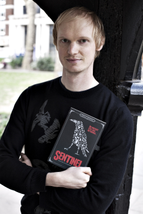FrightFest 2015 reaction: Slumlord
A terrifying central performance ensures that this peeping tom chiller remains unsettling and engaging despite a slow-moving plot and inherently unlikable characters.
“More than 30 million surveillance cameras have been sold in the last decade,” text at the start of Slumlord tells us, before introducing shambling Gerald (Neville Archambault), an elderly landlord who equips his property with hidden cameras, then rents it out to young newlyweds Claire (Brianne Moncrief) and Ryan (PJ McCabe).
Unbeknownst to them, Gerald then pores over his live stream, watching the couple's every movement. Gollum-like with his bulging eyeballs and pasty complexion, he's a demonic version of a landlord, the worst nightmare of anybody living in rented accommodation. And, with minimal dialogue and a permanently watery-eyed expression, Archambault is terrifyingly convincing, providing the twisted heart of a film more interested in reality-based terror than slasher movie goofiness.
The fact that Claire and Ryan aren't the most likeable of characters (she whines, he cheats) only adds to the realism, and actually benefits the film. They're believably flawed characters with their own petty problems, and we don't have to feel endeared to them to know that their victimisation is wrong. When the fist-chewing third act finally arrives, you root for them because – despite and because of their flaws – they feel like people you know.
That's credit to first-time director Victor Zarcoff, who fosters an increasingly claustrophobic mood, wisely intercutting CCTV footage with conventional movie stock so that Slumlord doesn't feel like a holdover from the dying age of found footage. And though his film spends much of its mostly gore-free 87-minute running time hanging out with the couple, Zarcoff cleverly positions us as voyeurs alongside Gerald. We're privy to often ugly, unflattering conversations that should remain private – though Zarcoff refrains from pushing this too far into the arena of bad taste.
Slumlord is effective because it preys on very real modern fears. With 8,000 people apparently unwittingly watched in their homes every year, Zarcoff's film cannily plays on that paranoia. Much of its power, though, comes not from the zeitgeist-y surveillance plot, but from Archambault's disturbing performance. If it's a case of human vs computer, it's his sweaty, inscrutable man who'll haunt your nightmares after the credits roll.
Get sneak previews, exclusive competitions and details of special events each month!
Josh Winning has worn a lot of hats over the years. Contributing Editor at Total Film, writer for SFX, and senior film writer at the Radio Times. Josh has also penned a novel about mysteries and monsters, is the co-host of a movie podcast, and has a library of pretty phenomenal stories from visiting some of the biggest TV and film sets in the world. He would also like you to know that he "lives for cat videos..." Don't we all, Josh. Don't we all.



